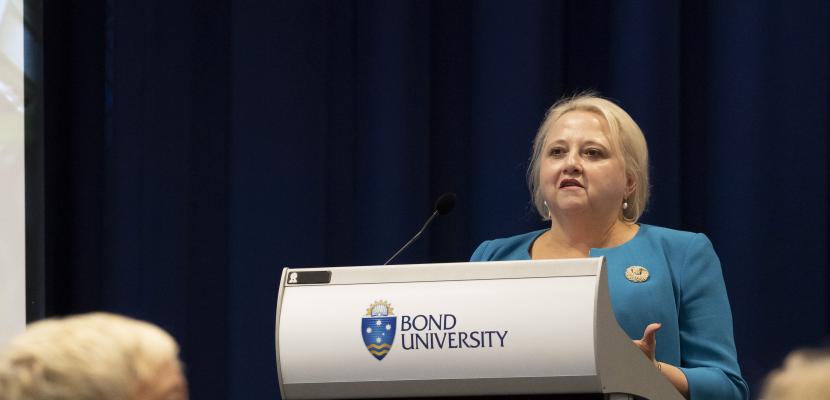
Written by Bond University's Deputy Vice Chancellor (Academic), Professor Keitha Dunstan.
Universities could axe their end-of-semester exams, big lectures and even paper as trends emerge from the COVID-19 pandemic.
Higher education will emerge into the ‘new normal’ with an evolved learning and teaching model. More authentic assessments, individualised lifelong learning and face-to-face delivery merged with technology in a multi-modal delivery format will likely dominate the higher education sector in a post-pandemic world.
One thing the sector has learnt since switching to remote learning is that students are enjoying being able to access classes, their lecturers and support services using technology. Students will want this real time online support to continue, so I do not think we will be able to take that away. However, critically, students are also missing the classroom experience. I think the future lies with a better hybrid model, one based on face-to-face learning, but with increased augmentation using integrated technological enhancements that go further than our past models of blended learning.
In line with this, learning materials will be different. When COVID-19 hit, universities moved quickly to remote learning using adapted teaching materials that were not purpose-built. In the future, universities will need to purpose-build learning materials for this hybrid multi-modal delivery.
The COVID-19 disruption has forced universities to complete our first semester of 2020 without invigilated, paper-based end-of-semester exams. This natural experiment has provided proof of concept that there are other forms of summative assessment that provide suitable assurance of learning, that are in fact, more authentic.
Making a change to authentic assessments will have one other environmentally friendly knock-on effect. There is a very real possibility that universities of the future can be paperless, because a lot of paper is generated unnecessarily, through antiquated styles of doing assessments and exams. If we get rid of that, perhaps we will not have to use paper anymore.
The success of the remote delivery of large lectures, together with future social distancing requirements, will make face-to-face large lectures a thing of the past. The idea of having a talking head out the front of hundreds of students in a face-to-face format, is almost absurd to think about in our new environment.
With all these changes comes the need for new business models, as universities realise they can no longer rely on the revenue generated from large numbers of international students. This means diversifying revenue streams, thinking about new types of learners and placing a greater emphasis on lifelong learning. There will be an increased focus on new short courses such as micro-credentials. Universities will need to be more responsive to what learners actually need, as opposed to retaining a focus on whole-of-degree study.
Globally, universities will be important players in the recovery from COVID-19. Our researchers and educators will contribute to the health, economic and social recovery of the world.
Universities have taken a battering for a while in the so-called ‘fake news’ environment, with many people choosing to listen to influencers rather than experts. But when things go wrong, people want to listen to experts, so universities have the opportunity to earn back their credibility.
But as well as expertise, universities can provide a pathway for those seeking to make their way in an uncertain new world. There is no doubt industries will change, some will die out, and new industries will spring up. Universities will have a key role to play in educating future workforces to take up opportunities in those new and emerging industries.
The world needs a future workforce that is adaptable, creative, and resilient. We will need to be more responsive to the needs of learners, and what industry and the community expect from us. Our courses will need to emphasise the so-called ‘soft skills’ valued by employers. At Bond University we have reinvented ‘soft skills’ as ‘essential skills’. Our Transformation CoLab was established to work with industry to ensure that Bond graduates master these essential skills. Bond’s Health, Digital, Legal and Entrepreneurial Transformation degrees, launched in 2020, specifically focus on workplace-based learning and prepare our students to apply design thinking to create innovative solutions.
Our world post-COVID19 will look very different to the one we inhabited before.
At a time where global movement remains constrained, where nationalism remains on the rise and where governments remain locked into election cycle short-termism, universities have an opportunity. In the ‘new normal’, universities can be the glue that holds together international harmony, to take the long-term view and think about what a global recovery looks like for the betterment of humankind.
As the critics and conscience of society, this is a leadership role that we must step up to.

